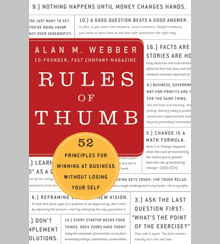Charles Darwin, Management Guru
Seth Godin, author of Linchpin: Are You Indispensable?, introduces a lesson on the role of diversity in business success from Rules of Thumb: 52 Truths for Winning at Business without Losing Your Self, by Alan M. Webber.
Survival is not enough. The world changes fast, far faster than we realize.
We think it’s always been like this. We’ve always had the Internet and there never was a nuclear arms race. We’ve always had e-mail and of course women go to work every day. We run our lives and our businesses as if the world has never changed and won’t change anytime soon.
This is nonsense. Mass extinctions happen on Earth and they happen in commerce, too. Entire classes of organizations disappear, and others rise. And no, it’s not a one-to-one substitution; there are ebbs and flows.
The race is won not by the swift, or even the strong. As Alan Webber, chronicler of our last few booms and busts, so ably points out in this excerpt from his new book, Rules of Thumb, the race is won by the species that adapts the most easily. Would that be you?
— Seth Godin
Excerpted from Rule #42 in Rules of Thumb: 52 Truths for Winning at Business without Losing Your Self
There’s not much to see at Olduvai Gorge. You can sit on a bench with a canopy overhead to protect you from the Tanzanian sun and hear a short talk about the different strata at which Mary and Louis Leakey discovered evidence of some of our earliest ancestors. You can walk through a small museum and stand in front of a plaster cast of Lucy’s footprints. But when you look over the edge down into the gorge itself you have to use your imagination to remind yourself: this is where it started for us. This is our shared ancestral home. Thinking about it that way makes the hair stand up on the back of your neck.
I was in Tanzania on a hybrid safari — part adventure, part “inventure.” The adventure part was led by Daudi Peterson, whose travel company and charitable foundation focus on helping the surviving indigenous tribes maintain their history and culture. During the day Daudi introduced us to the animals and wildlife of Tanzania and brought us into the lives of the Maasai, Hadzabe, and Dorobo tribes. At night around the campfire we had our “inventure” as Richard Leider led us through a series of exercises designed to encourage us to take stock of our work and our lives back in America.
“The survival laws of Africa are pretty simple,” Daudi and Richard said. “Eat. Don’t get eaten. Have sex to reproduce.”
The survival laws are never far from your mind, however, when you look down into Olduvai Gorge, travel across the Serengeti, and experience the everyday life of the tribespeople. We descended into the Ngorongoro Crater, an environment so strong you can feel the evolutionary forces at work. In this real-life Jurassic Park, alive with glorious wildlife, 80 percent of the animals die in their first year of life — food for the ones who survive.
Not far from there I got to experience the real world of our ancestral hunter-gatherers. I went digging with Hadzabe women and their digging sticks, chopping at the base of small bushes, unearthing tubers that we cooked over an open bonfire. That was the gathering part of a way of life that goes back more than sixty thousand years. The next day I got a chance to participate in the hunting part — walking for six hours behind a Hadzabe hunter who was armed with a bow and poisoned arrows. I came back with speargrass in both feet; he came back with a guinea fowl he’d shot through the neck and a family of redbills he’d scooped out of their nest. That night the tribe would eat fresh meat. A few days later I watched one of the last three Dorobo tribesmen stalk an impala — only three Dorobo left on the planet, and all of them men. Eat, don’t get eaten, have sex to reproduce. The Dorobo had violated the third law of survival.
At night I’d lie awake under the blanket of stars in the Southern Hemisphere, stars I never saw in the United States, and wonder what was going on back home — and back in corporate America. Lying in my sleeping bag, I tried to make the connection between the green hills of Africa and the white cubicles of America. What were we trying to achieve in those office buildings and factories? The people here knew exactly what they were trying to achieve. It wasn’t sophisticated; it didn’t promise a high standard of living. But it was elemental and unambiguous. They were trying to preserve a way of life. Every day was about one thing: survival.
What were we all about? How did survival fit in? Did it? Or was it submerged so far below the surface that we’d lost touch with that primal instinct?
For the first time I could see a company as a tribe, a group of people joined together to create a way of living that could continue into the future. Like the Hadzabe, companies are their people, living communities trying to make it another day, living according to the principles of biology and the laws of Charles Darwin.
Survival of the fittest. Survival, not of the strongest or richest, but of the most adaptable. Survival of the species with a gene pool diverse enough to keep it from becoming more and more specialized to conditions less and less likely to continue. A diverse gene pool could prevent a species — or a company — from driving headlong into a dead-end future.
You could think of a diverse gene pool as an insurance policy for change. And you could think of Charles Darwin as the most important management guru for business today.
The case for diversity used to rest on doing what was right. Our values argue for diversity. Our moral code tells us that equal opportunity is the American way of doing business. But at night in Tanzania I began to see another case for diversity: survival of the fittest. A diverse population gives any organization its best shot at survival. When change is rapid and unpredictable, diversity offers a chance at adaptation.
— Alan M. Webber
From Rules of Thumb: 52 Truths for Winning at Business without Losing Your Self by Alan M. Webber. Copyright © 2009 by Alan M. Webber. Reprinted by arrangement with HarperBusiness, an imprint of HarperCollins Publishers.


